|
|
|
Sort Order |
|
|
|
Items / Page
|
|
|
|
|
|
|
| Srl | Item |
| 1 |
ID:
120834
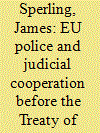

|
|
|
|
|
| Publication |
2013.
|
| Summary/Abstract |
Three key questions arise from the encroachment of the European Union (EU) on national prerogatives in the administration of justice: What factors contribute to the weakest link collective action problem attending police and judicial cooperation within the EU? What were the substantive and institutional goals of the EU in this policy domain? What accounts for the rising level of police and judicial cooperation despite the persistence of barriers to cooperation and incentives to defect? This article first establishes the fundamental incentives and obstacles to cooperation in matters of transnational security threats in post-Westphalian Europe. It then proceeds to explore the evolution of police and judicial cooperation in Justice and Home Affairs between 1999 and 2009, to assess national contributions to police and judicial cooperation, and to consider the potential impact that the changes introduced by the Lisbon Treaty, Stockholm Programme and European Investigation Order. A final question is considered in the conclusion: Did the level and extent of police and judicial cooperation that emerged between 1999 and 2009 give rise to a community of practice that in turn fostered a nascent community of identity resilient enough to mitigate the weakest link technology of public goods production endemic to this policy domain?
|
|
|
|
|
|
|
|
|
|
|
|
|
|
|
|
| 2 |
ID:
120827
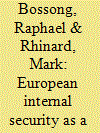

|
|
|
|
|
| Publication |
2013.
|
| Summary/Abstract |
This introduction argues for a new research agenda on European internal security cooperation from the perspective of public goods. We set out our case in three parts. First, we identify new empirical puzzles and demonstrate significant explanatory gaps in the existing internal security literature which public goods theory could help address. Second, we outline the building blocks of a public goods approach and provide an overview of its application, both existing and potentially, in various areas of regional security and European integration. Third, we present three complementary ways of using public goods theory to analyse internal security in the European Union, with the aim of spurring new research questions while accepting some limitations of this theoretical approach.
|
|
|
|
|
|
|
|
|
|
|
|
|
|
|
|
| 3 |
ID:
120833
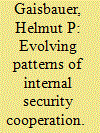

|
|
|
|
|
| Publication |
2013.
|
| Summary/Abstract |
This article discusses evolving patterns of internal security cooperation that start in the realm of international public law and end up more or less entirely in the treaty framework of the European Union. By applying the theory of clubs (Buchanan) it shows the fertility as well as limitations of a public goods approach to analyse and explain such instances of differentiated integration and to assess their effectiveness. By way of the comparative analysis of the Schengen regime and the Prüm Treaty it analyses five main stages of an internal security club's life circle from the causing obstacle (blocking of a certain policy) to the final incorporation endgame. Both clubs under investigation produced so-called network goods with negative rivalry logic, i.e. the more members participate and 'consume' the good the higher the benefit for all. However, it is also shown that club formation and expansion could not only be understood as a strategically rational process, and that various contextual costs inhibited the formation and eventual expansion of the clubs. The article concludes that incorporation efforts necessarily lead to pick-and-choose situations that preclude full uniformity; consequently, outside treaty clubs tend to create á la carte fragmentation to a certain degree.
|
|
|
|
|
|
|
|
|
|
|
|
|
|
|
|
| 4 |
ID:
120836
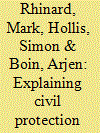

|
|
|
|
|
| Publication |
2013.
|
| Summary/Abstract |
In recent years the European Union has taken a number of steps towards improving civil protection cooperation in Europe. European leaders regularly declare the importance of boosting cooperation to prepare for and respond to disasters and emergencies afflicting member states. Those declarations have been accompanied by a flourish of policy activity, the building of new structures, and even treaty changes. On the surface, this little-known area of European integration appears to be proceeding with great success. A closer look, however, reveals significant gaps between member states' general expressions of enthusiasm and problematic cooperation in practice. We draw upon public goods theory to explain why this might be the case; more specifically, we identify likely game-theoretic obstacles to cooperation in different areas of the civil protection field. We evaluate our theoretical propositions by examining the current state of cooperation in marine pollution response, chemical contamination management, and flood response. We find that cooperation success in practice corresponds generally, but not perfectly, with the predictions of public goods theory. Our findings offer a nuanced view of civil protection cooperation in Europe and illuminate options for improved cooperation in the future.
|
|
|
|
|
|
|
|
|
|
|
|
|
|
|
|
| 5 |
ID:
120835
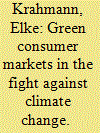

|
|
|
|
|
| Publication |
2013.
|
| Summary/Abstract |
Climate change has become one of the greatest threats to environmental security, as attested by the growing frequency of severe flooding and storms, extreme temperatures and droughts. Accordingly, the European Union's (EU) 6th Environment Action Programme (2010) lists tackling climate change as its first priority. A key aim of the EU has been to cut CO2 emissions, a major factor in climate change, by 8 per cent until 2012 and 20 per cent until 2020. The European Commission has proposed the encouragement of private consumer market for green products and services as one of several solutions to this problem. However, existing research suggests that the market share of these products has been only 3 per cent, although 30 per cent of individuals favour environmental and ethical goods. This article uses Public Goods Theory to explain why the contribution of the green consumer market to fighting climate change has been and possibly may remain limited without further public intervention.
|
|
|
|
|
|
|
|
|
|
|
|
|
|
|
|
| 6 |
ID:
120832
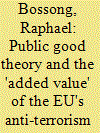

|
|
|
|
|
| Publication |
2013.
|
| Summary/Abstract |
This contribution analyses the EU's fight against international terrorism from the perspective of public goods theory. The first part develops an improved conceptualisation of collective action problems in this issue area, and presents a typology of related security goods according to different aggregation technologies (weaker links, summation, better shots). The second part embeds this theoretical framework in the European context, and presents an empirical survey of the EU's anti-terrorism efforts. It is argued that the EU has been comparatively effective in responding to 'weaker' link vulnerabilities, even if implementation records are uneven and boundaries of security cooperation remain unclear. In contrast, the EU could not effectively aggregate resources and act jointly in the international fight against terrorism. Due to the non-excludable nature of benefits (as in the case of foreign policy) or partial rivalry of consumption (as in the case of sensitive information), concerns with free-riding and crowding remain significant obstacles to collective action. Finally, the EU increasingly supports better shot efforts to develop new instruments and technologies to combat terrorism, but may be left behind by mini-lateral initiatives of its most capable member states.
|
|
|
|
|
|
|
|
|
|
|
|
|
|
|
|
| 7 |
ID:
120831
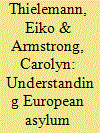

|
|
|
|
|
| Publication |
2013.
|
| Summary/Abstract |
Recent developments in European Union (EU) asylum cooperation raise important questions about the nature of cooperation and the potential problems facing collective action in the realm of EU internal security. The emergence and the subsequent stability of the Schengen/Dublin system is especially puzzling, given the highly inequitable distribution of costs and benefits that this system entails among the participating states and begs the question as to why those states that are likely to face a disproportionate 'burden' under the system would have agreed to it. This article seeks to provide an alternative approach to answering this question by drawing on a public goods framework. We argue that a simple focus on free-riding and exploitation dynamics, as emphasized in the traditional collective action literature, falls short as an explanation and instead demonstrates how more recent theoretical contributions to the public goods literature can offer new insights into the origin and evolution in cooperation in this sensitive policy area.
|
|
|
|
|
|
|
|
|
|
|
|
|
|
|
|
|
|
|
|
|